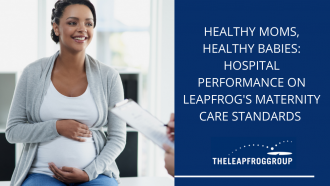
WASHINGTON, April 8, 2021—The Leapfrog Group, a national watchdog organization of employers and other purchasers focused on health care safety and quality, today released its 2021 Maternity Care Report, which measures hospital performance against best practices across three high-risk areas of maternity care: cesarean sections, episiotomies, and early elective deliveries. The report is based on results of the 2020 Leapfrog Hospital Survey, the flagship initiative of The Leapfrog Group. It is the only source of data on these measures that is publicly reported nationally, by hospital.
“The birth of a child is a life-defining experience, which is why I encourage families to find the highest performing hospital available for them,” said Leah Binder, president and CEO of The Leapfrog Group. "Though our report shows hospitals have made progress in many areas, too many are still performing unnecessary interventions that can pose risks to the mother and baby. Thanks to public reporting by The Leapfrog Group, and the thousands of hospitals that are transparent about their performance, expectant parents can compare hospitals on important indicators like C-section rates. If a hospital declines to report this information, that’s a major concern.”
Across all three measures included in the report show progress.
- NTSV C-section rates on average remain too high, though there has been modest progress. Survey results reveal that a record 51% of hospitals achieved Leapfrog’s NTSV C-section standard of 23.9% or less. This is notable improvement from 2019, when less than 42% of hospitals achieved the standard.
- Early elective delivery rates have dramatically decreased from a 17% starting point in 2010 to 1.6% in 2020, with nearly 92% meeting Leapfrog’s standard of an early elective delivery rate of 5% or less.
- The average episiotomy rate among reporting hospitals decreased to 5.2%, the lowest rate since Leapfrog began publicly reporting on the measure and encouragingly close to achieving Leapfrog’s target rate of 5% or less. Just five years ago, the average rate was over 10%.
“The variation in C-section rates is striking,” said Elliott Main, M.D., medical director of the California Maternal Quality Care Collaborative and chair of Leapfrog’s Maternity Care Expert Panel. “There are vast differences among states and among hospitals within each state. This suggests we aren’t yet seeing unified efforts to improve rates nationally. Achievements in reduction of early elective delivery and episiotomy rates show such change is possible.”
In some cases, a C-section is necessary to protect the health of the mother and baby, but C-sections can also carry serious risks of infection or blood clots, longer recovery periods and complications with future pregnancies. C-sections can also impact the health of babies, requiring treatment in a newborn intensive care unit, and an increased risk of developing chronic childhood diseases, such as asthma and diabetes.
There is a crucial need to improve quality of maternity care for all women, with special attention to those most at risk for death or harm. According to the March of Dimes, the rate of C-sections in Black women is higher than in women of other racial or ethnic groups.
In the 2021 Leapfrog Hospital Survey, Leapfrog added a new question about whether hospitals analyze quality measures by patient race, ethnicity, or primary language, to accelerate efforts to address such disparities in care.
Over 2,200 hospitals voluntarily submitted data used in the report, representing over 75% of U.S. hospital beds. The Survey results can be accessed for free at https://ratings.leapfroggroup.org/.
To learn more about Leapfrog’s maternity care measures, visit www.ratings.leapfroggroup.org/measure/hospital/maternity-care
+++
About The Leapfrog Group
Founded in 2000 by large employers and other purchasers, The Leapfrog Group is a national nonprofit organization driving a movement for giant leaps forward in the quality and safety of American health care. The flagship Leapfrog Hospital Survey and new Leapfrog Ambulatory Surgery Center (ASC) Survey collect and transparently report hospital and ASC performance, empowering purchasers to find the highest-value care and giving consumers the lifesaving information they need to make informed decisions. The Leapfrog Hospital Safety Grade, Leapfrog’s other main initiative, assigns letter grades to hospitals based on their record of patient safety, helping consumers protect themselves and their families from errors, injuries, accidents and infections.
